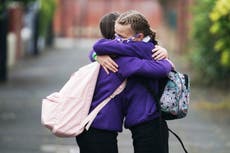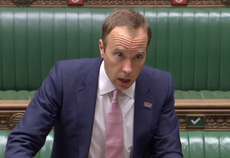Coronavirus: One in nine pupils absent from school as lack of testing drives fears of ‘lockdown by default’
Absence rate more than double that of pre-coronavirus times as testing crisis deepens
Your support helps us to tell the story
From reproductive rights to climate change to Big Tech, The Independent is on the ground when the story is developing. Whether it's investigating the financials of Elon Musk's pro-Trump PAC or producing our latest documentary, 'The A Word', which shines a light on the American women fighting for reproductive rights, we know how important it is to parse out the facts from the messaging.
At such a critical moment in US history, we need reporters on the ground. Your donation allows us to keep sending journalists to speak to both sides of the story.
The Independent is trusted by Americans across the entire political spectrum. And unlike many other quality news outlets, we choose not to lock Americans out of our reporting and analysis with paywalls. We believe quality journalism should be available to everyone, paid for by those who can afford it.
Your support makes all the difference.More than one in nine pupils were absent from school last week, government figures show, as teachers and unions warned a lack of available coronavirus tests meant more schools would be forced to close, leading to “lockdown by default”.
After schools reopened in England following six months of closure during the pandemic, education secretary Gavin Williamson touted the fact that 99.9 per cent of schools were open to at least some pupils.
But absence rates were more than double that of pre-Covid times, with Department for Education (DfE) statistics suggesting 12 per cent of pupils were not in attendance on 10 September.
Some 92 per cent of state schools were fully open, the DfE estimates, providing face-to-face teaching for pupils all day with no groups self-isolating. In these schools, 90 per cent of pupils were in attendance.
“The best place for children and young people to learn is in the classroom, and it’s encouraging to see that last week more than seven million pupils were back with their classmates and teachers at schools around the country,” Mr Williamson said, adding: “The fact that the vast majority of our schools are fully open is testament to the hard work of staff throughout the summer holidays in preparing for a safe return.”
But reports emerged of individual schools being forced to send hundreds of pupils home after identifying cases of coronavirus, in lieu of the affected pupils and teachers being able to access tests.
As chaos in the testing system — described by one MP as a “bloody mess” — dominated the Commons on Tuesday, with Twickenham’s MP saying constituents had found the only way to access a test in west London was to pretend to live in Aberdeen, health secretary Matt Hancock announced tests were being rationed.
Acknowledging "operational challenges" in the system, Mr Hancock said there would be "prioritisation" of tests for people with acute clinical need and those in social care settings.
With a prioritisation list not due for several days, this was widely interpreted to mean schools would be even less likely to be able to access tests.
One union warned of widespread school closures and “a return to lockdown by default”.
“We are getting reports of bubbles of 250 children being sent home. People on the ground are telling me this is not sustainable and they cannot keep their schools open,” said the Association of School and College Leaders’ general secretary, Geoff Barton.
In outrage over the lack of tests, teachers were set to hold a “staggered protest” outside the DfE on Wednesday afternoon in a demonstration organised by the Education Solidarity Network.
“I’m a teaching assistant in Bristol and have been off with cold-like symptoms. I now feel well enough to go back but I can’t. I’ve been trying to get a test all day but with no luck,” one supporter told the i newspaper.
And Mr Williamson was warned the government could face legal action for exposing teachers to the virus, with an snapshot online survey finding less than a quarter believed that sufficient measures had been put in place to make schools safe.
In a letter to the education secretary, teaching union NASUWT’s general secretary demanded better resourcing and monitoring of Covid-secure measures, after a straw poll of almost 1,000 school teachers found that 55 per cent did not regard the protections in place at their schools as “sufficient and effective”.
Patrick Roach told the education secretary that the union was “expressly reserving our members’ legal rights” in the case of a claim for breach of duty of care or personal injury due to foreseeable risks resulting from the government’s decision to tell schools to reopen to all pupils.
“With rising numbers of confirmed Covid-19 cases in the wider community, our members are deeply concerned that, in the absence of effective control measures, there is increased risk of Covid-19 transmission within schools," he wrote.
At least 339 schools across England and Wales have so far been forced to close partially or completely, The Mirror reported on Tuesday.
The health secretary admitted the testing problem would most likely last for “a matter of weeks”.
Responding to a question from his predecessor Jeremy Hunt as to whether he still believed the issue would be solved in a week, Mr Hancock said: “I think we will be able to solve this problem in a matter of weeks … we are managing to deliver record capacity, but as he well knows demand is also high.”
The backlog is thought to have been caused by a shortage of laboratory processing capacity for tests, which authorities say has created a “critical pinch-point” in the system. The failure has seen tests sent abroad to be processed, despite claims from the government that its system would be “world-beating".
In addition to current abatement measures, Boris Johnson most recently pinned his hopes for a way out of the resurgent crisis to a £100bn mass testing regime, which in theory would see 10 million people tested every day come early next year using technology that is currently still in development.





Join our commenting forum
Join thought-provoking conversations, follow other Independent readers and see their replies
Comments